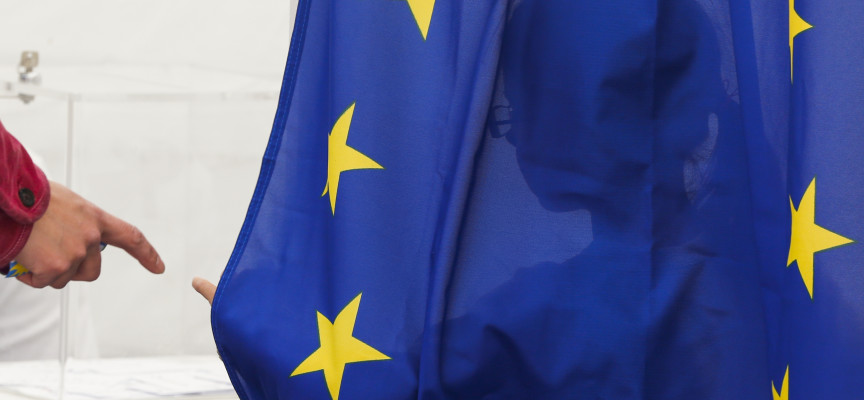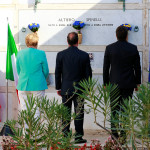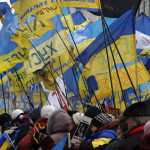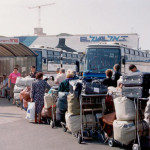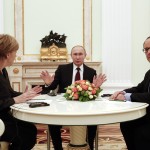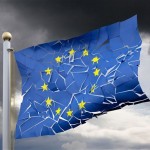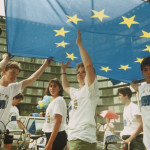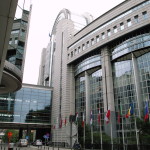Once again, another 9th of May which will pass unnoticed. A date ignored, apart from the valiant members of the European Movement. The 9th of May, 2014 will be however accompanied by a French-German meeting between François Hollande and Angela Merkel on the Baltic. But it will be a European feast day with no joy. A working day in a Europe on the dole for too many young people. An unpopular day in a Europe in the grip of populists. A day that no elected member chooses to render a public holiday. A day in the middle of a campaign that is similar to a gloomy plain, as Waterloo, despite the efforts of the chief candidates of discussing together on TV.
Yet all the ingredients are combined together for a real European campaign: the destabilization of our Ukrainian neighbour, and the lessons that have still to be learned about the crisis in the Euro zone, to mention only the topics that should be obvious. But it’s no use: abstention risks to become, once again, the first European party. Extremists, such as the Front national in France, will show off.
Yes, a 9th of May really sad, when “St. Schuman” – as the European functionaries nickname this day – a public holiday only for them, is useful only to remember what the building of Europe is based on. To inspire all of us repeatedly to go back there. Above all, when times are harder and the project less clear.
The crisis of the Euro has highlighted a crisis of the meaning of the project of Europe, together with a question to which it is urgent to answer: Europe, why? If we give an answer, we will go to the polling station on May 25th more willingly.
However, an answer will be symbolically given a month after the vote. The 26th of June, at the time of the centenary of the beginning of the First World War, the European Council will meet exceptionally in Ypres, a small Belgian town, martyr of the so-called “European civil war”. This symbolic displacement of the 28 heads of state and government is welcome. When the national commemorations of the years 1914-1918 will be organized in the different countries this would be of importance. Moreover, in direct relation with the European Union. For, all in all, the Union comes out of this war and of the Second which it caused.
This is both clear and never sufficiently expressed. In this regard, a European commemoration would deserve much more than the time of a lunch of the Twenty-eight in Ypres.
Sarajevo as well has foretold a European event. But a European memorial, for example in Verdun in occasion of the 1916 centenary, would be meaningful and would embody this primary meaning of the building of Europe, as François Mitterrand and Helmut Kohl were able to do with their historic handshake in 1984 at Douaumont ossuary. This gesture is used still today to illustrate Europe in school textbooks.
Someone will retort that we have enough of these commemorations, that they will not provide jobs for our youth, that they will not supply us with gas without depending on Russia, neither will change the exchange rate of Euro. Obviously, one does not cancel the other out. Quite the reverse: it is these strong times, this place of memories, these steles erected that can breathe new life into us, to make us start again and better. We would need this so much! This is why we do not have to overlook any 9th of May.
Encore un 9 mai qui passe inaperçu. Une date ignorée, sauf pour les valeureux militants du Mouvement européen. Le 9 mai 2014 est toutefois ponctué d’une rencontre franco-allemande entre François Hollande et Angela Merkel au bord de la Baltique. Une fête de l’Europe sans joie. Un jour non chômé dans une Europe au chômage pour trop de jeunes. Un jour impopulaire dans une Europe en proie aux populistes. Un jour qu’aucun élu n’ose rendre férié. Un jour au milieu d’une campagne électorale qui ressemble, comme Waterloo, à une morne plaine, malgré les efforts des têtes de listes de débattre ensemble à la télévision. Tous les ingrédients sont pourtant réunis pour une campagne véritablement européenne: la déstabilisation de notre voisin ukrainien et les leçons encore à tirer de la crise en zone euro, pour ne citer que les thèmes qui devraient s’imposer. Et pourtant rien n’y fait: l’abstention risque de nouveau de devenir le premier parti européen. Les extrémistes, comme le Front national en France, vont pavoiser.
Oui, bien triste 9 mai 2014 alors que la “saint Schuman”, comme les fonctionnaires européens surnomment ce jour férié seulement pour eux, sert à rappeler sur quoi repose la construction européenne. Pour toujours nous en inspirer, toujours y revenir. Surtout quand les temps sont plus difficiles, le projet moins évident. La crise de l’euro a fait ressortir une crise de sens du projet d’Europe unie à laquelle il est urgent de répondre : pourquoi l’Europe ? En y répondant, on prendra plus volontiers le chemin du bureau de vote le 25 mai.
Une réponse sera symboliquement donnée mais plus d’un mois après le scrutin. Le 26 juin, au moment du centenaire du déclenchement de la Première guerre mondiale, le Conseil européen se réunira exceptionnellement à Ypres, petite ville belge, martyre de ce qu’on a appelé la “guerre civile européenne”. Ce déplacement symbolique des 28 chefs d’Etat et de gouvernement est bienvenu. Alors que les commémorations nationales de 1914-1918 sont organisées pays par pays, une commémoration européenne aurait toute son importance. De surcroît en lien direct avec l’Union européenne.
Car, en somme, l’Union sort de cette guerre et de la seconde qu’elle entraîna. C’est à la fois évident et jamais assez formulé. A cet égard, une commémoration européenne mériterait bien plus que le temps d’un dîner des Vingt-Huit à Ypres. Sarajevo a prévu aussi un événement européen. Mais un mémorial européen, par exemple à Verdun pour le centenaire de 1916, ferait sens et incarnerait ce sens premier de la construction européenne, comme François Mitterrand et Helmut Kohl surent le faire par leur poignée de main historique en 1984 à l’ossuaire de Douaumont. Ce geste sert aujourd’hui encore à illustrer l’Europe dans les manuels scolaires.
On rétorquera: assez de ces commémorations, ce n’est pas elles qui procureront du travail à nos jeunes, qui nous approvisionneront en gaz sans dépendre de la Russie ou feront varier le cours de l’euro. A l’évidence et l’un n’empêche pas l’autre. Au contraire, ce sont ces temps forts, ces lieux de mémoire, ces stèles érigées qui peuvent nous ressourcer collectivement, Européens, pour mieux repartir. Nous en aurions tant besoin. C’est pourquoi il ne faut négliger aucun 9 mai.
Non si può dimenticare
Un altro 9 maggio che passa inosservato. Data ignorata, fatta eccezione per i coraggiosi attivisti del Movimento europeo. E per un incontro franco-tedesco tra François Hollande e Angela Merkel sulle rive del Baltico. Una festa dell’Europa senza gioia. Una giornata non libera dal lavoro in un’Europa disoccupata per troppi giovani. Una giornata impopolare in un’Europa afflitta dai populisti. Un giorno che nessun eletto osa rendere festivo. Un giorno, nel bel mezzo di una campagna elettorale che assomiglia, come Waterloo, a una pianura triste, nonostante gli sforzi dei capi lista di discutere insieme in televisione. Tuttavia gli ingredienti per una campagna veramente europea ci sono tutti: la destabilizzazione della nostra vicina Ucraina e le lezioni ancora da imparare dalla crisi nella zona euro, per citare solo gli argomenti che dovrebbero imporsi. Eppure, inutilmente: l’astensione rischia di nuovo di diventare il primo partito europeo. Gli estremisti, come il Fronte Nazionale in Francia, agiteranno le proprie bandiere.
Sì, è un ben triste 9 maggio 2014 mentre il “san Schuman”, come i funzionari europei soprannominano questo giorno che è festivo solo per loro, serve a ricordare su che cosa si basa la costruzione europea. Per trarre sempre ispirazione, per ritornarci sempre. Soprattutto quando i tempi sono difficili, il progetto meno chiaro. La crisi dell’euro ha evidenziato una crisi di senso del progetto dell’Europa unita, a cui è urgente rispondere: perché l’Europa? Rispondendo, sarà più facile fare il percorso verso il seggio elettorale, il 25 maggio.
Una risposta verrà data simbolicamente, ma più di un mese dopo le elezioni. Il 26 giugno, in occasione del centenario dello scoppio della Prima guerra mondiale, il Consiglio europeo si riunirà eccezionalmente a Ypres, piccola cittadina belga, martire della cosiddetta “guerra civile europea”. Questo spostamento simbolico di 28 capi di Stato e di governo è il benvenuto. Mentre commemorazioni nazionali del 1914-1918 sono organizzate nei singoli paesi, una commemorazione europea avrà tutta la sua importanza. E in più, in collegamento diretto con l’Unione europea.
Perché, insomma, l’Unione deriva da questa guerra e dalla seconda che si è trascinata dietro. Questo è evidente, ma mai abbastanza ribadito. A questo proposito, una commemorazione europea meriterebbe molto di più del tempo di una cena dei Ventotto a Ypres. Anche Sarajevo ha programmato un evento europeo. Ma un memoriale europeo, ad esempio a Verdun per il centenario del 1916, avrebbe senso e incarnerebbe questo significato primo d’integrazione europea, come François Mitterrand e Helmut Kohl sono stati in grado di fare con la loro storica stretta di mano nel 1984 presso l’Ossario di Douaumont. Questo gesto serve ancora a illustrare l’Europa nei libri di testo delle scuole.
Si replicherà: ne abbiamo abbastanza di queste commemorazioni, non sono queste che daranno il lavoro ai nostri giovani, che ci forniranno gas senza fare affidamento sulla Russia e che faranno variare il valore dell’euro. È evidente, ma una cosa non esclude l’altra. Al contrario, sono questi momenti forti, questi luoghi della memoria, queste steli erette che potranno farci ringiovanire collettivamente, noi europei, per ricominciare in meglio. Ne avremmo molto bisogno. Ecco perché non si può dimenticare il 9 maggio.
Sebastien Maillard
Latest posts by Sebastien Maillard (see all)
- A Pope worried for the future of Europe - 27 novembre 2014
- Pope Francis begins with Albania - 21 giugno 2014
- Francis: a non-European pope, and yet… - 9 giugno 2014

